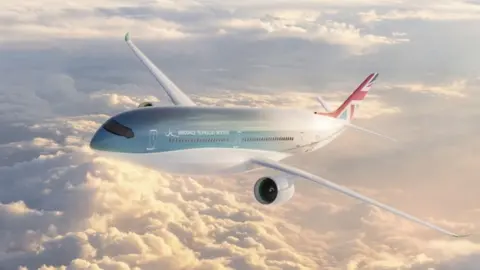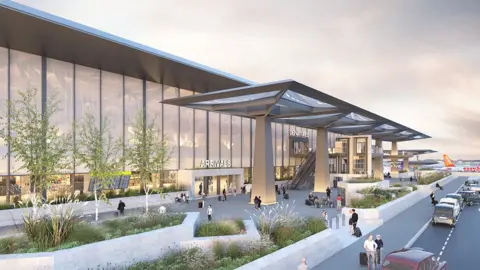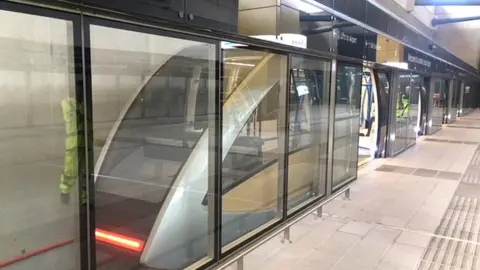Green air travel possible - Cranfield University professor
 Department of Transport/PA Media
Department of Transport/PA MediaAirports can be green and air travel could be cheaper eventually, but first a high level of investment is needed, a scientist has told the BBC.
Prof Pericles Pilidis, of Cranfield University in Bedfordshire, said new hydrogen-powered airliners could be a reality within 10 years.
He claimed expanding airports could also be greener in the long term.
Meanwhile, Luton Airport said its new rail link between the terminal and railway station would cut emissions.
 LLAL
LLALProf Pilidis, head of Cranfield's Power and Propulsion Department, said zero-carbon hydrogen-powered aircraft would stop air travel damaging the environment.
Asked if airport expansion could be green, he said: "The answer is a categorical 'yes' - subject to the right investments being put in place.
"There is going to be a high transition cost - but in the longer term green aviation could be cheaper than the air travel we have at the moment."
 BBC/Andy Holmes
BBC/Andy HolmesAt Luton Airport, a brand new Direct Air-Rail Transit (DART) system, that will link the airport terminal with Luton Airport Parkway railway station, is due to open this year, which the airport said would reduce its carbon footprint.
The council-run company that owns the airport - Luton Rising - has long-term plans to increase passenger numbers to 32 million a year.
Graham Olver, chief executive officer of Luton Rising, said: "Green-controlled growth is the new framework to make absolutely certain to everyone that when there are promises made for the environment in developing the airport, the promises are kept."
The plans will be independently judged by four legally bound criteria - aircraft noise, air quality, greenhouse gas emissions and public transport use.
In the short term, the company that runs the airport - London Luton Operations Ltd - said it was proposing to increase the number of passengers from a maximum of 18 million a year to 19 million.
The company said pre-Covid, passenger numbers were approaching 18 million, but 2022 was likely to see about 12 million as the industry recovers from pandemic restrictions on travel.
'No-one taking responsibility'
Environmentalist Jeremy Williams, of Zero Carbon Luton, said he was not convinced by the airport's arguments.
"The problem you always have is that Luton Airport can only control ground operations," he said.
"So things like DART will help reduce emissions on the ground, but as soon as the planes take off, no-one is taking responsibility for those emissions.
"The carbon footprint of Luton Airport in 2019 was 1.4 million tonnes of CO2... 1.2 million tonnes of that was from the planes.
"So green-controlled is great and I applaud them for it, but we're talking about a small fraction of the overall impact."
The government is holding an inquiry into Luton Airport's plans to expand to 19 million passengers.
Politics East airs on BBC One in the East on Sunday, 22 May at 10:00 BST and can be viewed on the BBC iPlayer afterwards.

Find BBC News: East of England on Facebook, Instagram and Twitter. If you have a story suggestion email [email protected]
